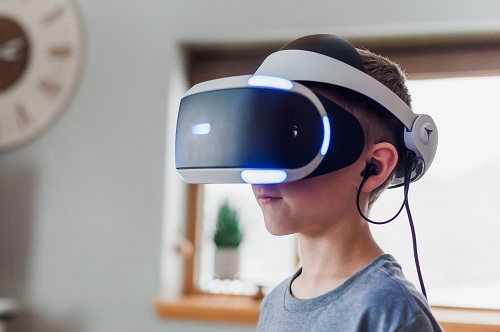
If we become concerned about you or anyone else while using one of our services, we will act in line with our safeguarding policy and procedures. This may involve sharing this information with relevant authorities to ensure we comply with our policies and legal obligations.
Find out how to let us know if you're concerned about another member's safety.
Find out how to let us know if you're concerned about another member's safety.
Could virtual reality have helped you learn at school?
Options

Cher_Alumni
Scope alumni Posts: 5,741 Disability Gamechanger
Sienna, who was born with a type of Muscular dystrophy, tells us why she thinks virtual reality has a place in disabled students learning.
“Life is difficult. This is a great truth, one of the greatest truths.”
This is the opening line of the book “The less traveled road” by Scott Peck. When I first read this in my senior year in high school, I felt relief in my heart. Sometimes we forget that everyone out there is facing their own battle. At that point in my life, it was essential for me to remember this. A few months later, my high school friends would each find their professional and personal way in life. While I, on the other hand, was on the brink of depression because I assumed my disability-related barriers would be impossible to overcome.
About my impairment
When I was a little baby, my parents were told that I wouldn’t be able to walk on my own. I was born with a type of Muscular dystrophy that meant I wasn’t expected to be able to stand up. Nevertheless, I had a relatively happy childhood and for this I owe a lot to my dear parents.
But as I grew older, I felt different from the rest of my friends and that caused me to develop depression. At the end of high school, I had a big mental dip to the point I started a six-month therapy course.
My introduction to virtual reality
In 2016, I came across this fancy virtual reality video and was impressed. The technology was officially introduced a few years ago (in 2010 I think) but for me, it was the first time I’d ever seen it. This strong first impression led me to doing a few weeks of online research to learn more about virtual reality tech. My interest in it intensified especially when I read about its potential application in helping disabled people like myself. I knew that if it would help me, it would do a world of good for my mental health, the quality of my life and that I could give a hand to other disabled people facing similar struggles.
After some lengthy thought, I decided to attend a pre-university course in the field to gain some professional expertise with a view to helping others. My goal was to provide other disabled people with relevant information that could help them live a barrier-free life.
I now want to use my studies to encourage disabled people to learn more about virtual reality technology and discover ways it can help them.
How can virtual reality help disabled students?
Equality is something education must stand for and although schools have made progress, more remains to be done. Disabled students still face a lot of different problems and I know this from my own experience in school. So, the question is: can virtual reality technology play a role in tackling the problem? I say yes it can.
Virtual reality can provide disabled students with:
· Customization
· Inclusion
· Participation
These are three branches of the same tree that complement each other. This is my example:
Customization
Disabled students may have specific needs due to their physical impairments. Let say a student has partial eyesight loss and in a normal class setting clear vision is essential for him to understand the material. There are virtual reality goggles and additional gears that enable these students to see clearly.
· Customization
· Inclusion
· Participation
These are three branches of the same tree that complement each other. This is my example:
Customization
Disabled students may have specific needs due to their physical impairments. Let say a student has partial eyesight loss and in a normal class setting clear vision is essential for him to understand the material. There are virtual reality goggles and additional gears that enable these students to see clearly.
Participation
When the student knows what is being talked about in the class, with the help from this virtual reality, they can engage all their senses in the learning process and participate in discussions taking place. This is an essential element for everyone to excel in school.
Inclusion
It is of great importance for disabled students to feel part of the learning process. When needs are met, students can participate equally.
When the student knows what is being talked about in the class, with the help from this virtual reality, they can engage all their senses in the learning process and participate in discussions taking place. This is an essential element for everyone to excel in school.
Inclusion
It is of great importance for disabled students to feel part of the learning process. When needs are met, students can participate equally.
Why I believe virtual reality should become part of the classroom.
These factors were important for me when I think of my own time in high school.
Many classes, especially those held in laboratories, required certain body movements for an experiment to be performed. I would never be able to conduct an experiment on my own because sometimes I was supposed to be standing on my own feet or moving in a certain way which I couldn’t do. This meant I only learnt from what I saw other students doing. I knew what was going on, but I didn’t felt part of it. I didn’t feel any sense of achievement and this impacted my career decisions as a disabled student.
Thank you to Sienna for her interesting blog!Over to you:
- What do you think to her ideas?
- Can you see virtual reality helping disabled students in the future?
- Do you think virtual reality could have helped you at school?
Leave Sienna a message in the comments below to let her know.
Online Community Co-ordinator
Want to tell us about your experience on the online community? Talk to our chatbot and let us know.
Want to tell us about your experience on the online community? Talk to our chatbot and let us know.
Concerned about another member's safety or wellbeing? Flag your concerns with us.
Brightness
Categories
- All Categories
- 13K Start here and say hello!
- 6.6K Coffee lounge
- 104 Games lounge
- 416 Cost of living
- 4.3K Disability rights and campaigning
- 1.9K Research and opportunities
- 199 Community updates
- 9.3K Talk about your situation
- 2.1K Children, parents, and families
- 1.6K Work and employment
- 777 Education
- 1.7K Housing and independent living
- 1.4K Aids, adaptations, and equipment
- 615 Dating, sex, and relationships
- 363 Exercise and accessible facilities
- 738 Transport and travel
- 31.6K Talk about money
- 4.4K Benefits and financial support
- 5.2K Employment and Support Allowance (ESA)
- 17.1K PIP, DLA, and AA
- 4.9K Universal Credit (UC)
- 6.3K Talk about your impairment
- 1.8K Cerebral palsy
- 868 Chronic pain and pain management
- 180 Physical and neurological impairments
- 1.1K Autism and neurodiversity
- 1.2K Mental health and wellbeing
- 319 Sensory impairments
- 825 Rare, invisible, and undiagnosed conditions
Complete our feedback form and tell us how we can make the community better.